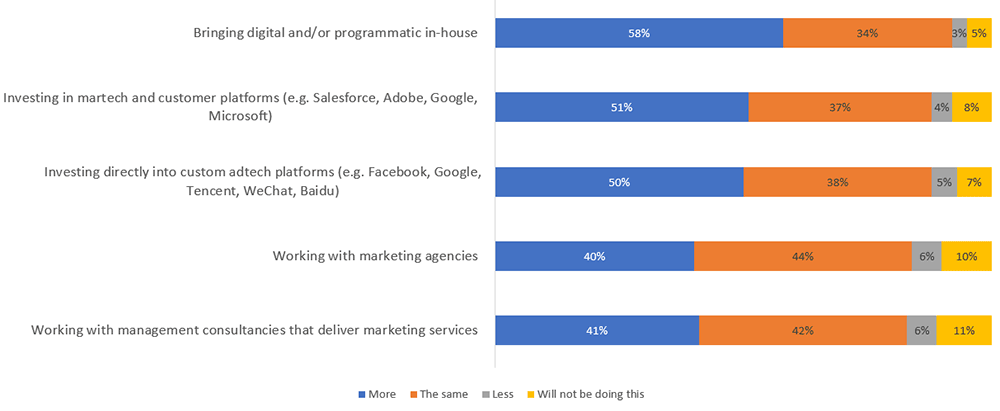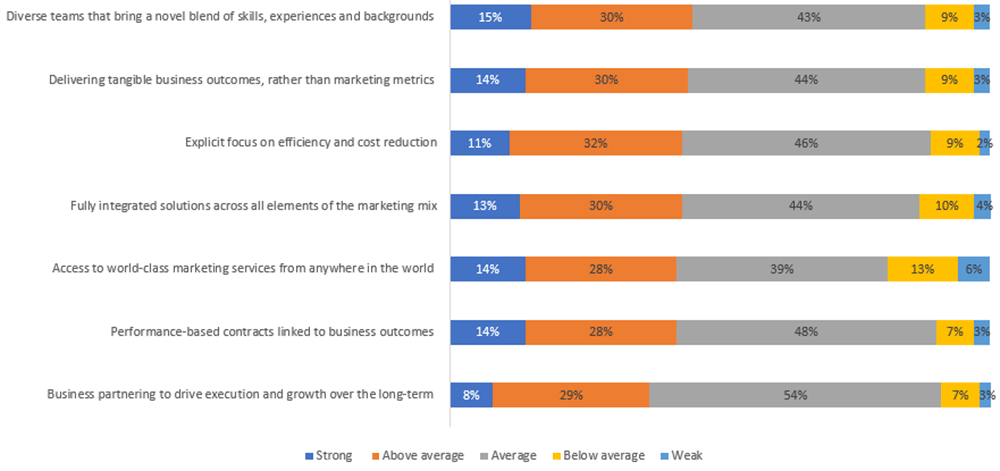Dentsu Aegis' Tim Cooper explores three key trends from the network's recent CMO survey.
Our global survey lifts the lid on the future hopes and fears of 1,000 CMOs across 10 markets and here we dive into their views of the changing relationship between marketers and agencies. For all the talk of competition and disruption to the agency model, it’s clear that marketers continue to view agencies as key to effectiveness. But there are also signs that significant modifications are needed if those relationships are going to realise sustainable, long-term growth for all involved.
1. Managing disruption in the marketing ecosystem
Today’s marketing ecosystem is undoubtedly complex. New digital technologies and services are forcing brands to constantly evolve the way they configure marketing services. Within that context, the headline story of the last year has been in-housing. A massive 92% of CMOs report that they will bring digital and/or programmatic capability in-house more or at the same level over the next 2-3 years. This is particularly prevalent in the energy, technology and telco sectors.
We are starting to see businesses now asking for help to integrate these capabilities—and our recent point of view on in-sourcing highlights the risk of an ‘ROI honeymoon’ turning into ROI erosion—but the trend nonetheless looks set to continue.
Furthermore, 88% of CMOs intend to invest more (or at similar levels) in martech and adtech platforms, benefitting from the measurable ROI that they deliver with marketing agencies (84%) and management consultancies (83%) equally important elements of the CMO strategy.
The challenge for agencies is to see these trends not as threats, but as opportunities to provide impartial, strategic counsel to brands on how best to configure their partnerships and alliances.
Figure 1: In-housing is the key trend shaping the marketing ecosystem
In terms of delivering your marketing objectives for the company, will you do more or less of each of the following over the next 2-3 years?

Source: Dentsu Aegis Network CMO survey 2019
2. An agency relationship fit for the future
Overall, the outlook for agencies looks positive. 41% of CMOs anticipate an increase in the work they do with agency partners and just 6% expect to do less—figures that match almost precisely with the intention to use management consultancies. But there are signs too that marketing agencies need to address how they are delivering against changing client needs.
In 2018, one-fifth of CMOs pointed to marketing agency capability as a barrier to building better relationships with consumers. In 2019, that number has risen to one-third, driven in particular by views across the food & beverage and telco sectors, raising questions about how well agencies are adapting to client needs that are evolving rapidly in the face of constant disruption.
The ability to deliver integrated solutions is also a concern. Less than half (43%) of CMOs believe agencies do a good job of providing fully integrated solutions.
How do agencies stay relevant? By focusing on their core points differentiation and expertise: consumer insight and creativity. Two-thirds (65%) of CMOs believe that a deeper understanding of consumers and culture is the best way for agencies to differentiate themselves, with a similar proportion identifying the ability to develop creative ideas and campaigns. But legacy matters less. Only 46% of CMOs believe that a track record and history in the industry is important.
Figure 2: Consumer insight and creativity remain key differentiators for agencies
What are the most important future sources of differentiation for marketing agencies? (% ranking it in top 3)

Source: Dentsu Aegis Network CMO survey 2019
3. Time for a new client-agency model?
How will commercial models and relationships between agencies and marketers evolve? Our survey reveals a number of factors at play:
Long-term partnership: Only 37% of CMOs believe that agencies are strong business partners over the longer term, though this may partly be explained by brands’ own focus on near-term returns (nearly half of the CMOs we surveyed have strategic plans that look ahead for just 2 years or less).
Focus on outcomes: 58% of CMOs believe that agencies are average or worse when it comes to committing to performance-based contracts linked to business outcomes.
Global excellence: About a quarter of CMOs believe that their agencies are weak at providing world-class services anywhere in the world—the number one weakness identified.
Figure 3: There are a number of areas in which agencies can improve client service
As far as the marketing agencies you work with are concerned, how well do you think they demonstrate the following attributes?

Source: Dentsu Aegis Network CMO survey 2019

